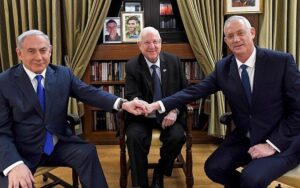
The National Interest Foundation Newsletter
Issue 41, April 16, 2020
Welcome to our NIF Newsletter. In this week’s headlines: the latest domestic updates on the COVID-19 outbreak including President Trump’s decision to halt U.S. funding for the World Health Organization, the world’s major oil-producing nations reach an agreement to cut output in an attempt to stabilize the market, Israeli President Rivlin gives the Knesset the mandate to form a government after Gantz and Netanyahu fail to do so by the extended deadline, and Libya’s internationally-recognized Government of National Accord makes significant gains over Haftar’s Libyan National Army forces.
Latest Domestic Updates on COVID-19

At Tuesday’s coronavirus task force briefing, Trump announced that he is halting U.S. funding to the WHO. (Photo from Getty Images)
Trump Halts U.S. Funding for the World Health Organization
This week, President Trump announced that he was halting funding of the World Health Organization (WHO) while his administration reviews their handling of the coronavirus outbreak. The United States has more confirmed coronavirus cases than any other country in the world, and is the single-largest donor to the WHO, contributing around 15% of the organization’s budget. Trump’s decision prompted condemnation from health experts and world leaders, with the European Union’s top foreign policy representative Josep Borrell denouncing the move and emphasizing that the WHO’s efforts are needed now more than ever to help contain and mitigate the ongoing coronavirus pandemic. Domestically in the United States, there are around 650,000 confirmed cases of the virus, with over 30,000 fatalities.
OPEC+ Deal

OPEC+ nations announced a deal to cut oil output in the coming months. (Photo from Bloomberg)
Oil-Producing Nations Agree to Historic Production Cut
The world’s major oil-producing nations reached an agreement to slash production in an attempt to stabilize the market, which has been hit hard by the coronavirus crisis. The group which includes Saudi Arabia and Russia, and is known collectively as OPEC+, struck a deal to cut output by 9.7 million barrels a day in the coming months. Oil prices have fallen to record lows in recent weeks, largely due to the global outbreak of the coronavirus which has decreased energy demand. While oil prices did initially jump on Monday after the agreement, they fell again later in the week and most analysts contend that the deal is unlikely to solve the demand crisis brought about by the coronavirus pandemic, despite the historic nature of the oil-production cuts. Worldwide fuel consumption is down roughly 30%, so ultimately it appears as though demand concerns will supersede any potential oil price gains.
Political Deadlock in Israel

The deadline for Gantz and Netanyahu to agree on a power-sharing government was extended, but passed with both sides still at an impasse. (Photo from GPO)
Israeli President Rivlin Gives Government Mandate to the Knesset
Israel remains in a political deadlock as rivals Benjamin Netanyahu and Benny Gantz negotiate a power-sharing agreement. Israeli President Reuven Rivlin had initially set a deadline for the government to be formed by Monday at midnight, but Netanyahu and Gantz jointly requested an extension until Wednesday at midnight as a deal was seemingly close. However, the deadline passed with both sides at an impasse, and President Rivlin will now give the Knesset a mandate to form the government. A prime minister and cabinet ministers will need to be selected with a simple majority. Israel’s parliament will have three weeks to nominate the government, and if there is no solution, then Israelis will head to the polls for an unprecedented fourth election in just over a year.
GNA Gains in Libya

Libya’s internationally-recognized government has made significant strides in the country’s ongoing conflict. (Photo from Flickr)
Libya’s Government of National Accord Makes Significant Gains
Libya’s internationally-recognized Government of National Accord (GNA) has made significant progress in the country’s ongoing conflict against rogue General Khalifa Haftar. In the past week, the GNA has captured seven strategically important towns from forces loyal to General Haftar. The towns are northeast of Tripoli, between the capital city and the border with Tunisia. The capture of these towns comes on the back of General Haftar’s failed year-long offensive to take Tripoli. With the GNA having spent the last year on the defensive, this marks a change in strategy as the regime pivots to the offensive. Following this latest development, General Haftar’s forces launched rocket attacks on targets in Tripoli. One of the rockets targeted Tripoli’s lone airbase, and many landed in civilian areas.
